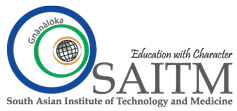LEARNING OUTCOMES :
1. Subject specific knowledge to;
A. Identify medico legal and ethical issues in medical practice encountered as a practicing doctor and his responsibility
B. Identify medico legal and ethical issues in forensic medical practice encountered as a medico legal (Forensic) practitioner in the
government health sector and his responsibility.
C. Outline the medico-legal frame work and the relevant sections of the Penal Code, Criminal Procedure Code and Transplantation of
Human Tissue Act of Sri Lanka.
D. Identify record, form an opinion and report on different types of injuries and describe their medico-legal significance.
E. Describe the different injury patterns and circumstances under which they occur.
F. Explain the concept of death, make the diagnosis of death, issue the Certificate of Cause of Death and describe the procedure
involved in disposal of death and exhumation.
G. Describe the changes, which take place in a body after death and their medico-legal significance.
H. Perform postmortem examinations, record observations, formulate causes of death, carry out further investigations and draw conclusions.
I. Examine victims and suspects in cases of assault, accidents, sexual offences, abortion, child abuse, wife battery/gender based violence,
elder abuse, torture, drug & alcohol abuse and any such person that the Court directs.
J. Fill relevant medico-legal Forms and to complete reports and give oral evidence in the court of law as an expert witness.
K. Explain the methods in establishing the identity of the deceased or the living.
L. Visit and examine a scene of crime with a team, collect evidence and formulate conclusions.
M. Describe the medico-legal investigations of sudden, unexplained, unexpected, obscure and suspicious deaths.
N. Describe the medico-legal investigations of deaths due to accidents, suicides, homicides, civil and criminal negligence.
O. Describe medico legal importance of mental disorders.
P. Identify the types, circumstances, principles of management of common poisons in Sri Lanka.
Q. Identify basic concepts in forensic entomology, anthropology, archeology, criminalistics and other alight forensic sciences
relevant to practice of forensic medicine.
2. Subject specific skills
Develop capability of the student to recognize, describe and interpret the injuries and other forensic conditions in dead, living or at a scene of crime and to arrive at conclusion for medico legal purposes.
The objective of the clinical appointment.
80% attendance is compulsory.
At the end of the 2 weeks Clinical Appointment in Forensic Medicine you should be able to:
1. Examine patients for medico-legal purposes
2. Identify types of injuries
3. Describe injuries for medico-legal purposes
4. Categorize injuries (category of hurt)
5. Complete Medico Legal examination Form (Police-20) & Medico Legal Report (Health-1135)
6. Perform a routine postmortem examination
7. Identify the postmortem changes
8. Describe the postmortem findings in a routine postmortem examination
9. Writing a Post Mortem Report in Health 42 form
10. Formulate Cause of Death according to WHO classification
11. Identify, describe & formulate conclusions on, plant, soft tissue and bone specimens
3. Subject specific attitudes
- Develop an unbiased attitude towards society especially with regard to victims and suspects
- Cultivate attitudes necessary to function as a member of a team in investigation of crime
- Cultivate attitudes necessary for multidisciplinary investigation approach
- Develop an attitude to carry out functions and duties that will fulfill legal and ethical requirements




